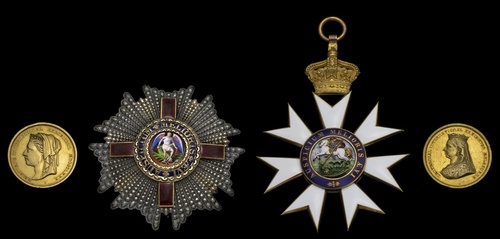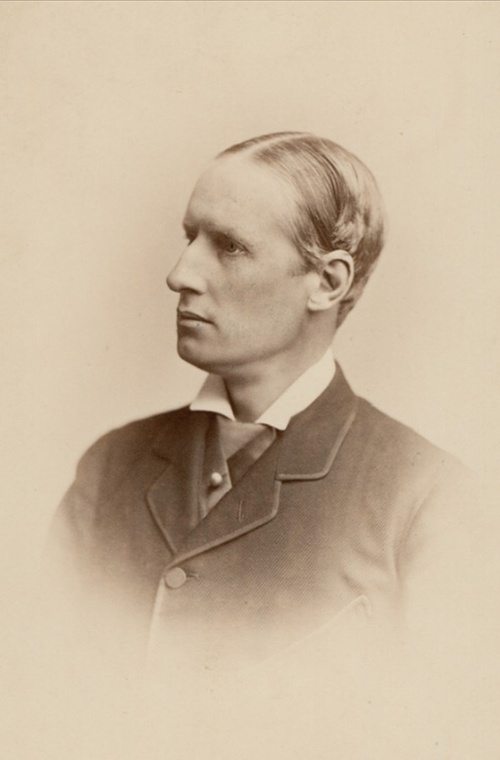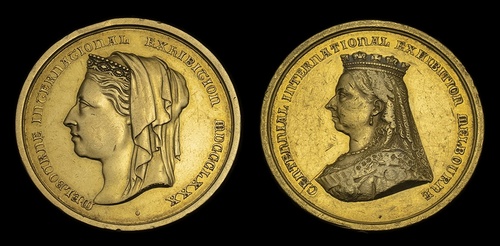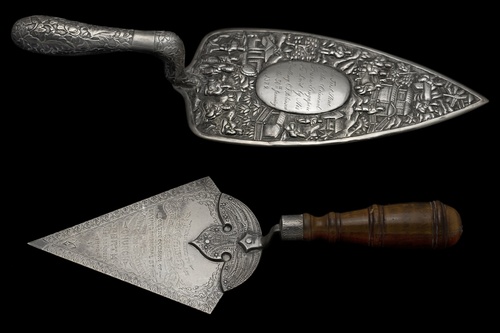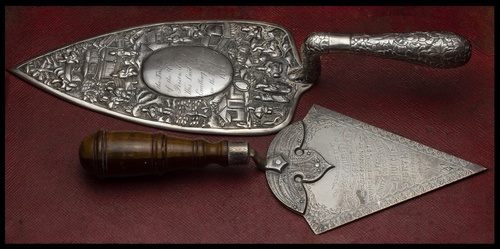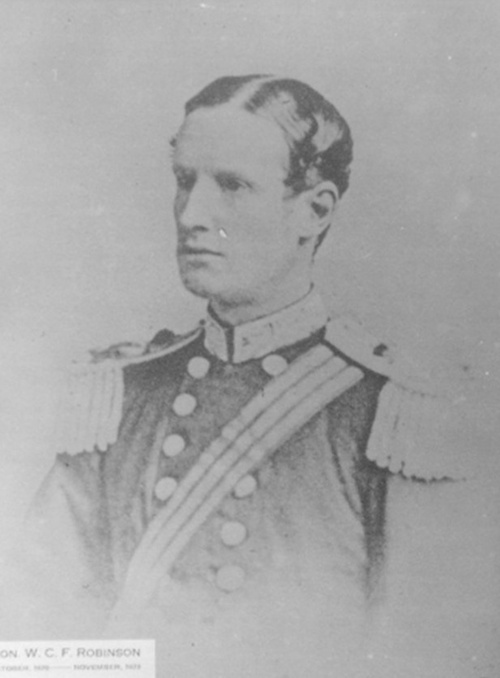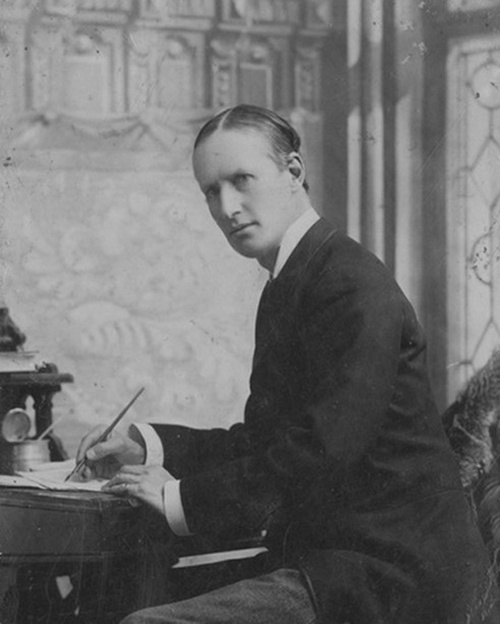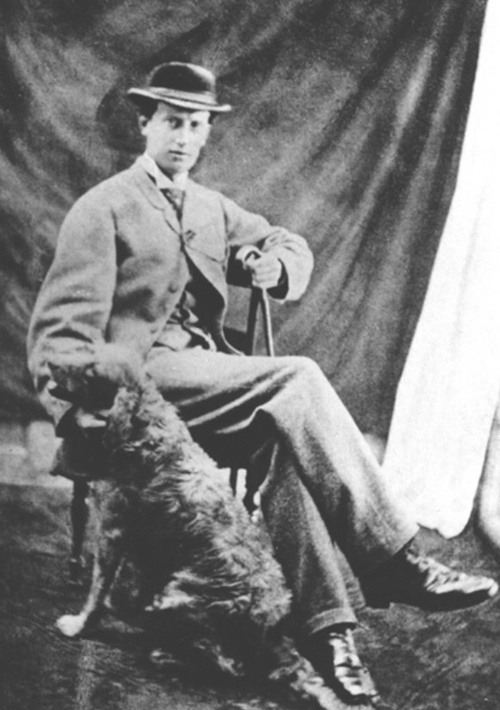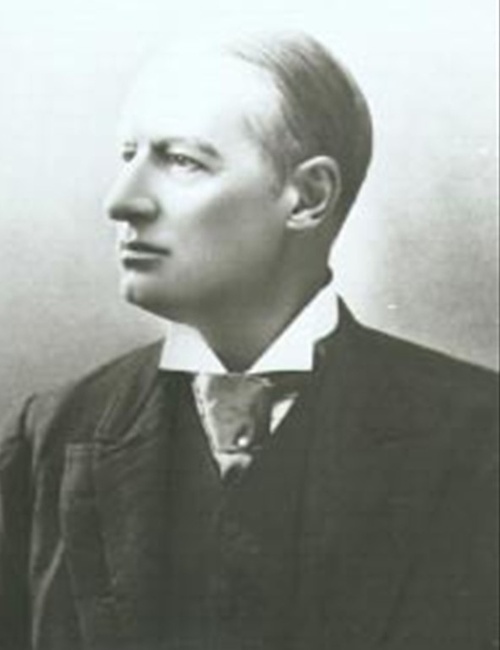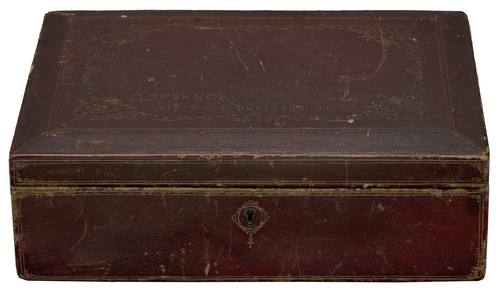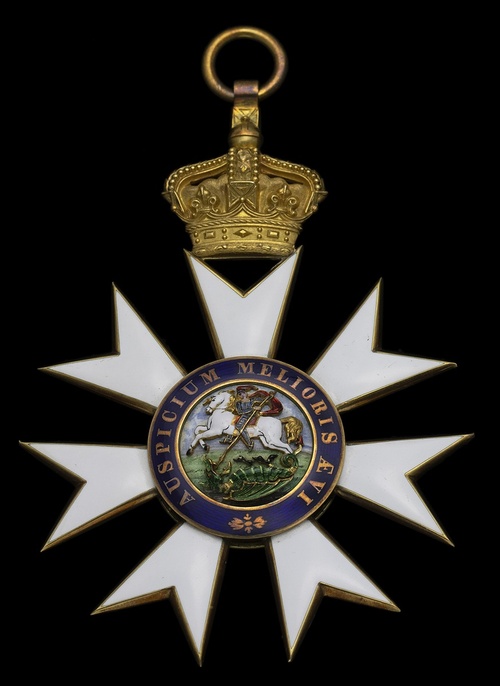Auction: 24003 - Orders, Decorations and Medals
Lot: 224
Sold by Order of a Direct Descendant
The remarkable G.C.M.G., Gold Prize Medals and other artefacts awarded to Sir W. C. F. Robinson, a prominent and important Colonial Governor
During a distinguished career he held the positions of Governor of South Australia, the Straits Settlements, Western Australia, the Leeward Islands, also being Lieutenant-Governor of Prince Edward Island and Governor of the Falklands Islands
The Most Distinguished Order of St. Michael and St. George, Knight Grand Cross (G.C.M.G.) set of Insignia, comprising Badge, gold and enamel; breast Star, silver and enamel with gold retaining pin, some enamel missing to reverse of first, overall very fine (2)
Sold together with an impressive archive comprising:
i)
Melbourne International Exhibition gold medal, 22 carat, 50.96g (Sir. W. F. C. Robinson K.C.M.G. - For Services), by H. Stokes, Melbourne dated 1880
ii)
Centennial International Exhibition Melbourne gold medal, 24 carat (tests as .999 fine), 45.70g (H. E. Sir William C. F. Robinson G.C.M.G. Governor S.A.) by Stokes and Martin, Melbourne, struck at the Melbourne Mint, dated 1880
iii)
Governor's Dispatch Box named 'Governor Sir W. C. F. Robinson, G.C.M.G.', somewhat scuffed
iv
Silver presentation trowel engraved '...the first stone of the Criminal Prison Singapore was laid by his His Excellency C. F. Robinson on the 30th January 1879'
v
Presentation trowel 'Presented to His Excellency Sir William C. F. Robinson G.C.M.G. on the occasion of laying Memorial Stone of Trinity Congregation Church Perth 22nd March 1893'
vi
Three photograph albums containing multiple photographs, newspaper cuttings and letters as well as a scrap book containing the same, heavy foxing, the last missing its cover, nearly very fine (4)
vii)
A copy of Sea Drift by Rear Admiral Robinson, light foxing, very fine (Lot)
William Cleaver Francis Robinson was born at Rosmead, Westmeath, Ireland on 14 January 1834, the fifth son of Admiral Hercules and Frances Robinson. Two of the younger Robinson's brothers went on to be Officers of the Royal Navy, his father meanwhile had served during the Napoleonic War and was present at Trafalgar. Educated at the Royal Naval School at New Cross he entered the Colonial Service in 1855 as Private Secretary to his older brother Sir Hercules Robinson, later Baron Rosemead.
When his brother was posted overseas as the youngest ever Governor of Hong Kong, Robinson when with him, watching and learning as his brother presided over the acquisition of the Kowloon Peninsula. Marrying Olivia Dean, daughter of the Bishop of Meath on 7 April 1862 he was appointed President of the Island of Monserrat. Reportedly upon arriving at his new posting Robinson was carried ashore on the back of the 'Coxswain of the boat that had brought him there'.
Transferred to Dominica in January 1865 he had a difficult time in the nascent colony, once being forced to confront an angry mob. He laid down his role in October 1865 although it was not to be his final time in the region.
Falklands Islands
Appointed to his first Governorship on 23 May 1866, Robinson was posted to the Falkland Islands. However, his career almost ended upon his arrival as, while landing from the sloop Spiteful, he fell into the water by the Jetty and nearly drowned. Fortunately he was rescued by a William Coulson whom he rewarded with a Government Post. The Colony was still developing at this stage with a census just two years earlier giving the population at 662, only the Eastern part of the Island had been properly settled and there was no direct taxation at that point.
Robinson moved quickly to improve matters, significantly settling the Western part of the Island, greatly reducing the time needed for the colony to become self-funding. He also introduced the first postal date stamp, the Black Stamp, to the region. It is notable that Robinson considered the standard of living on the Islands so high that it could well start to pay tax towards its own upkeep, although this did not occur during his tenure.
Prince Edward Island
Leaving the Falklands Robinson does not appear to have thought fondly on his time there, referring to it 'the fag end of the world'. He was appointed Lieutenant Governor of Prince Edward Island in October 1870 to find a difficult political argument in progress. The position of the Colonial Office was that the colony should be pushed into a union with the other North American Colonies as soon as possible.
This however was not popular with the local politicians who were of an independent mindset. Robinson saw quickly that the only way to force a political union would be to create some financial impetus for doing so. As such he decided to create such a crisis that the government would be forced to reach out to the other colonies for aid thus creating grounds for a union.
He suggested to the Government that they attempt to construct a railway which they elected to do in October 1871. The effects were being felt within the year and Robinson wrote in September 1872 that he thought a vote in favour of Confederation was not far away. As predicted in February the next year the Premier Robert Haythorne opened negotiations to join the Dominion of Canada.
Robinson was quick to point out that this was largely due to his handling of the situation and was appointed a C.M.G. for his work. His work had indeed accomplished what was required and as such he moved on returning to the Caribbean taking an interim role as Governor of the Leeward Islands that year.
Western Australia and the Straits Settlements
Robinson had by this time proven his capacity and as such was appointed Governor of Western Australia, assuming administrative control on 11 January 1875. His role in the early tenure was to attempt to reduce the calls for increased self-government which he largely succeeded in doing. Little information is readily available on this first tenure beyond that, he was soon transferred to the Straits Settlements in 1877.
Here he does not seem to have been readily accepted by a population tired of short-term governors, the China Overland Mail states:
'From all accounts, Sir William is a cautious man who steadily adheres to instructions from Downing Street, and, as our late Governor was sometimes disposed to kick over the traces, the change will be a relief to the mind of Lord Carnarvon.'
He visited Siam in 1878, his somewhat ironic mission being to present the King with the G.C.M.G. which he did, in exchange receiving the Grand Cross of the Order of the Crown of Siam. His health recovered Robinson was appointed Governor of Natal but replaced before he could take up the roll and returned to Western Australia in 1879.
This second term saw Robinson taking on the economic problems with the territory, a difficult task as they were at the time in debt. He was further frustrated with the system of representatives, finding himself with little power and a hesitant advisory body which hindered any efforts to affect real change. He described it as 'neither flesh, fowl, nor good red-herring' (Australian Dictionary of Biography, refers). Despite these issues by the end of his tenure in 1883 Robinson had turned a debt of £80,000 into a surplus of £32,000.
Southern Australia
Upon his appointment to the role of Governor of Southern Australia in 1883 a piece of Robinson's own composition was played 'Unfurl the Flag', which he had prepared in Adelade while awaiting the official appointment. The local political contests were extremely robust and he was seen as a moderating influence, although his role was largely symbolic. One of Robinson's first acts was to weigh in on the debate surrounding the annexation of New Guinea by Queensland. The Derry Journal quotes him on the matter:
'My Government requests me to convoy their opinion that New Guinea should be under British rule, and they hope that the action of the Government of Queensland will have that effect.'
In the event the British Government did take direct control of the region, the rest of Robinson's tenure was to be politically quiet. That however is not to say that it was uninteresting, he was involved in the development of musical, literary and educational groups, several songs he had composed were popular throughout Australia. He led the celebrations for Queen Victoria's Jubilee, published several books and regularly entertained at the Government House.
Recognition came in 1887 in his promotion to the G.C.M.G. and offered the governorship of Hong Kong although he turned down the latter honour as he feared the climate would damage his health. Laying down his role in 1889, having served South Australia for six years, he too up an acting role in Victoria that same year before returning to Britian.
Constitution
It was decided that he would undertake a third term as Governor of Western Australia and while in Britian Robinson helped the delegates for Western Australia and the Colonial Office draw up the new Constitution Bill. As the new Governor it was his duty to take the bill to Perth, arriving in October 1890 to widespread rejoicing, partly due to the return of an able and well-known Governor but also because the arrival of the Constitution heralded the end of a period of political strife.
It was Robinson's duty to arrange the first elections for the new legislature, choosing John Forrest as the first premier. The new constitution reduced the powers and responsibility of the Governor and soon Robinson's role became more ceremonial than political. He clashed with Forrest on occasion, most notably over control of the Aboriginals which was the one power the new premier's new role lacked. Despite this Forrest clearly appreciated Robinson's role and offered him the post of agent-general in London when his term of office ended in 1891. Robinson considered this but eventually refused instead returning to London.
Epilogue
Returning to London he took several company directorships and remained a senior member of the Colonial Service but was offered no further appointments, reflecting the fact that they were now the preserve of grander figures. The age of the professional Victoria Governor was passing as Colonies began the move towards self-governance the role became increasingly ceremonial and was increasingly given to members of the nobility. An Article in the National Observer entitled, Modern Men states:
'Sir William Cleaner [SIC] Francis Robinson, Governor and maker of songs, is among the last of a race- a race of colonial Governors. Ripe is the constitutional experience; made wise by the tough sport of ruling communities unknown and raw like the Falkland Islands, demure and exasperating like Prince Edward Island, indolent and half-savage like the Straits Settlements, dignified and anxious to be thought dignified like South Australia, and commercially prosperous like Victoria: this office-worn servant of the Empire is in the shadow of Downing Street again on leave, fresh from launching Western Australia upon the tide of her new constitution, Wither now? That, let the gods and their deputies in Downing Street decide. Be it ours to try and seize upon those characteristics which have lifted him from a private secretaryship to be at last, after thirty years' yeoman service as representative of her Majesty, Deacon of his Craft- the doyen of colonial Governors.'
Robinson died at South Kensington on 2 May 1897; sold together with copied research.
Subject to 20% VAT on Buyer’s Premium. For more information please view Terms and Conditions for Buyers.
Sold for
£8,000
Starting price
£8000

